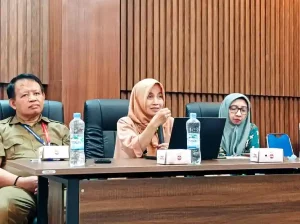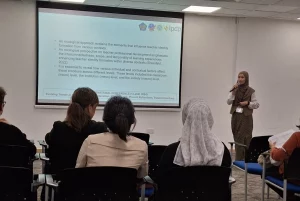UNAIR NEWS – Rabies has been the main concern of the World Health Organization (WHO) and the World Organisation for Animal Health (WOAH). It causes nearly 70 thousand cases annually. In Indonesia, the death cases caused by rabies are still quite high.
Prof. Dr. Jola Rahmahani drh MKes made the statement during her scientific oration on Professor Inauguration at the Garuda Mukti Hall, MERR (C) Campus, on Thursday, March 2, 2023. She believed that Rabies Free Indonesia 2030 must be encouraged.
Challenges in rabies vaccination in Indonesia
The Professor of Veterinary Microbiology revealed that the rabies animal vaccination program in Indonesia faces several cultural, social, and economic obstacles. The nation’s cultural diversity gives different perspectives of each ethnic group towards dogs as the main carrier of rabies, which increases their susceptibility to infection.
“In some areas, dogs are used for ‘adu bagong’ traditional battle in West Java, for hunting companions in West Sumatra, helpers on voyages for the Bugis people, and used as food. Though, the consumption has been dropped thanks to the dog meat-free campaign,” she said.
“Besides, the disease elimination also faced technical obstacles, such as rabies vaccination status, interactions with other dogs, the dogs’ physical conditions, the number of dogs kept in captivity, and the uncontrolled population of rabies-transmitting animals and released pets,” she stated.
Oral rabies vaccine trial
The professor further said that the rabies vaccine program also experienced several obstacles in effectiveness and efficiency, particularly to stray dogs. Therefore, some actions need to be taken, including by trial application of oral rabies vaccine to stray dogs and released dogs.
“Oral vaccination of wild animals is an important step in controlling rabies. Oral rabies vaccine has advantages for the mass vaccine program because of its effectiveness and the greater number of individuals vaccinated,” she said.
“Oral rabies vaccination prevents the virus spread among the population and cuts down the infections risks to the domestic animals and human population. Besides, some countries have been using it with good results,” Prof. Jola added.
In the end, she emphasized that rabies virus surveillance research in Indonesia is important in determining the virus strain for future vaccination, especially in the archipelagic country, which may generate different types of rabies virus.
“Intersectoral partnership, research, adequate funding, surveillance, and comprehensive data collection are the first steps in rabies elimination. Vaccine development is urgently necessary to stop the transmission and save more lives from deadly bites of rabies-transmitting animals,” she said.
Author: Rafli Noer Khairam
Editor: Khefti Al Mawalia









